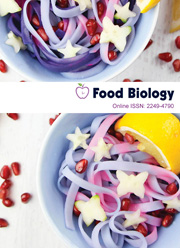Antibacterial activity of Lactobacillus species against some pathogenic and food spoilage bacteria
DOI:
https://doi.org/10.25081/fb.2025.v14.9224Keywords:
Lactic Acid Bacteria (LAB), Pathogenic and food spoilage bacteria, Antimicrobial activityAbstract
The present study was conducted to examine the antimicrobial activity of different Lactobacillus species against pathogenic and food spoilage bacteria. Four species of Lactobacillus were isolated from homemade cheese, raw milk, dosa paste, sauce, and curd. Lactobacillus species isolated from the sampled food source include; Lactobacillus brevis, Lactobacillus plantarum, Lactobacillus fermentum, and Lactobacillus casei. The antimicrobial activity of L. plantarum (P2), L. brevis, L. plantarum (P1), L. casei, and L. fermentum was investigated against Escherichia coli, Staphylococcus aureus, Pseudomonas aeruginosa and Bacillus cereus using well diffusion method of the indicator isolate. The results reveal that the L. plantarum (P2) has highest inhibition zones towards E. coli (25.7±1.35 mm), S. aureus (27.6±0.94 mm), P. aeruginosa (24.4±1.05 mm), and B. cereus (04.2±0.17 mm). The lowest zones of inhibition towards the sampled pathogenic and food spoilage bacteria were reported by L. casei. Our results confirm that the L. plantarum (P2), L. brevis, L. plantarum (P1), L. casei, and L. fermentum had efficient antimicrobial inhibitory effect on E. coli, S. aureus, P. aeruginosa, and B. cereus. Thus these Lactobacillus species could be effectively used for the protection of food from different pathogenic and food Spoilage bacteria.
Downloads
References
Arbulu, S., Gómez‐Sala, B., Garcia‐Gutierrez, E., & Cotter, P. D. (2022). Bioprotective Cultures and Bacteriocins for Food. In F. J. de Bruijn, H. Smidt, L. S. Cocolin, M. Sauer, D. Dowling & L. Thomashow (Eds.), Good Microbes in Medicine, Food Production, Biotechnology, Bioremediation, and Agriculture (pp. 89-112) New York, US: John Wiley & Sons Ltd. https://doi.org/10.1002/9781119762621.ch9
Gad, S. A., El-Baky, R. M. A., Ahmed, A. B. F., & Gad, G. F. M. (2016). In vitro evaluation of probiotic potential of five lactic acid bacteria and their antimicrobial activity against some enteric and food-borne pathogens. African Journal of Microbiology Research, 10(12), 400-409. https://doi.org/10.5897/AJMR2015.7781
Gatesoupe, F. J. (1999). The use of probiotics in aquaculture. Aquaculture, 180(1-2), 147-165. https://doi.org/10.1016/S0044-8486(99)00187-8
He, Y., Huang, H., Li, D., Shi, C., & Wu, S. J. (2018). Quality and Operations Management in Food Supply Chains: A Literature Review. Journal of Food Quality, 2018, 279491. https://doi.org/10.1155/2018/7279491
Hsiu, C. M., Feng, H. S., Hua, C. J., Fang, L. M., Shuh, C. C., & Chen, W. S. (2016). Antibacterial activity Lactobacillus plantarum isolated from fermented vegetables and investigation of the plantaricin genes. African Journal of Microbiology Research, 10(22), 796-803. https://doi.org/10.5897/ajmr2016.7922
Jones, R. J., Wescombe, P. A., & Tagg, J. R. (2011). Identifying new protective cultures and culture components for food biopreservation. In C. Lacroix (Eds.), Protective Cultures, Antimicrobial Metabolites and Bacteriophages for Food and Beverage Biopreservation (pp. 3-26) Sawston, UK: Woodhead Publishing. https://doi.org/10.1533/9780857090522.1.3
Kalhoro, M. S., Anal, A. K., Kalhoro, D. H., Hussain, T., Murtaza, G., & Mangi, M. H. (2023). Antimicrobial Activities and Biopreservation Potential of Lactic Acid Bacteria (LAB) from Raw Buffalo (Bubalus bubalis) Milk. Oxidative Medicine and Cellular Longevity, 2023(1), 8475995. https://doi.org/10.1155/2023/8475995
Korcari, D., Secchiero, R., Laureati, M., Marti, A., Cardone, G., Rabitti, N. S., Ricci, G., & Fortina, M. G. (2021). Technological properties, shelf life and consumer preference of spelt-based sourdough bread using novel, selected starter cultures. LWT, 151, 112097. https://doi.org/10.1016/j.lwt.2021.112097
Lappa, I. K., Kachrimanidou, V., Alexandri, M., Papadaki, A., & Kopsahelis, N. (2022). Novel Probiotic/Bacterial Cellulose Biocatalyst for the Development of Functional Dairy Beverage. Foods, 11(17), 2586. https://doi.org/10.3390/foods11172586
O'Sullivan, L., Ross, R. P., & Hill, C. (2002). Potential of bacteriocin-producing lactic acid bacteria for improvements in food safety and quality. Biochimie, 84(5-6), 593-604. https://doi.org/10.1016/S0300-9084(02)01457-8
Raman, J., Kim, J.-S., Choi, K. R., Eun, H., Yang, D., Ko, Y.-J., & Kim, S.-J. (2022). Application of lactic acid bacteria (LAB) in sustainable agriculture: Advantages and limitations. International Journal of Molecular Sciences, 23(14), 7784. https://doi.org/10.3390/ijms23147784
Sabo, S. d. S., Vítolo, M., González, J. M. D., & Oliveira, R. P. d. S. (2014). Overview of Lactobacillus plantarum as a promising bacteriocin producer among lactic acid bacteria. Food Research International, 64, 527-536. https://doi.org/10.1016/j.foodres.2014.07.041
Thongphichai, W., Pongkittiphan, V., Laorpaksa, A., Wiwatcharakornkul, W., & Sukrong, S. (2023). Antimicrobial Activity against Foodborne Pathogens and Antioxidant Activity of Plant Leaves Traditionally Used as Food Packaging. Foods, 12(12), 2409. https://doi.org/10.3390/foods12122409
Ušković, J., Kos, B., Beganović, J., Pavunc, A. L., Habjanič, K., & Matošić, S. (2010). Antimicrobial activity–the most important property of probiotic and starter lactic acid bacteria. Food Technology and Biotechnology, 48(3), 297-307.
Vasiljevic, T., & Shah, N. P. (2008). Probiotics—From Metchnikoff to bioactives. International Dairy Journal, 18(7), 714-728. https://doi.org/10.1016/j.idairyj.2008.03.004
Verschuere, L., Rombaut, G., Sorgeloos, P., & Verstraete, W. (2000). Probiotic bacteria as biological control agents in aquaculture. Microbiology and Molecular Biology Reviews, 64(4), 655-671. https://doi.org/10.1128/mmbr.64.4.655-671.2000
Vignolo, G., Saavedra, L., Sesma, F., & Raya, R. (2012). Food Bioprotection: Lactic Acid Bacteria as Natural Preservatives. In R. Bhat, A. K. Alias & G. Paliyath (Eds.), Progress in Food Preservation (pp. 451-483) New York, US: John Wiley & Sons Ltd. https://doi.org/10.1002/9781119962045.ch22
Published
How to Cite
Issue
Section
Copyright (c) 2025 Mamta Sahu

This work is licensed under a Creative Commons Attribution-NonCommercial-NoDerivatives 4.0 International License.



 .
.